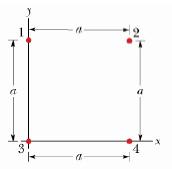four particles form a square. the charges are q1 = q4 = Q & q2 = q3 = q
(a) What is Q/q if the net electostatic force on particles 1& 4 is zero? (b) is there any value of q that makes the net electrostatic force on each of the four particles zero? Explain.
Look at teh above figure

(a)
the net x-component of force on particle 1 will be given as
F1x = F2 + F4x
there is not effect due to presence of 3 in x-direction
so,
F1x= kq.Q / a2 + [kQ.Q / (a√2)2].cos45
= kQ. [ q / a2 + (Q / 2a2 )cos45 ]
now, as per given
if the net electostatic force on particles 1& 4 is zero
then,
F1x= 0
or
kQ. [ q / a2 + (Q / 2a2 )cos45 ] = 0
by solving further, we get
q + Q / 2√2 = 0
or
Q/q = -2√2
..
(b)
the net y-component of force on particle 2 will be given as
F2y = F3y + F4y
there is not effect due to presence of 1 in y-direction
so,
F1x= [kq.q / (a√2)2].sin45 + kq.Q / a2
= kq. [ (q / 2a2 )sin45 + Q / a2 ]
now, as per given
if the net electrostatic force on particles 1& 4 is zero
then,
F2y= 0
or
kq.[ (q / 2a2 )sin45 + Q / a2 ] = 0
by solving further, we get
q / 2√2 + Q = 0
or
Q/q = - 1 / (2√2)
.
so, as the ratios of Q/q in both cases do not match it will be impossible for us to make a situation in which force on all charges will be equal. No, equilibrium situation will be made here.

